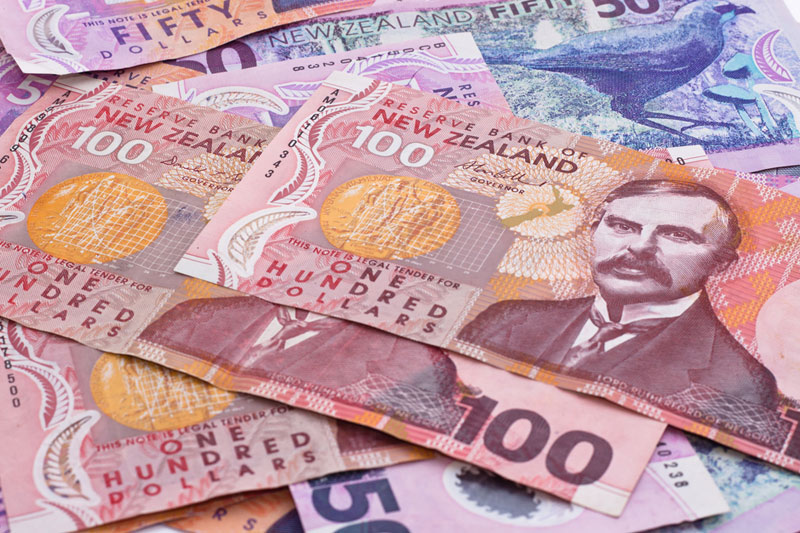Investing.com - The New Zealand dollar fell during morning Asian trade on Tuesday, easing after an initial spike following fourth quarter inflation figures that rose more than expected.
Data released by Statistics New Zealand showed inflation rose 0.1% in the fourth quarter and up 1.6% on year, taking annual inflation up to a level last seen in the first quarter of 2012. Market expectations were for a 0.1% drop on the quarter and gain of 1.5% on the year. The inflation gain could put pressure on the Reserve Bank of New Zealand to hike its official cash rate in early 2014 on accelerating economic growth amid housing and other capacity constraints.
Later today the Bank of Japan is scheduled to start its two-day policy board meeting with a decision due on Wednesday. The Bank of Japan's nine-member board is expected to stand pat on monetary policy and may say downside risks in overseas markets have eased from the state of play seen in the semi-annual Outlook Report issued in October.
AUD/USD traded down 0.04% at 0.8807, USD/JPY traded down 0.02% at 104.15, and NZD/USD traded down 0.05% to 83.20.
On Monday, the euro remained under pressure amid concerns that the subdued inflation outlook for the euro zone may prompt the European Central Bank to ease monetary policy further in order to safeguard the fragile recovery in the region.
The loonie, as the Canadian dollar is also known, remained under pressure amid expectations that the Bank of Canada will stick to its dovish stance on rates at this week’s policy meeting.
The U.S. dollar index, which tracks the performance of the greenback versus a basket of six other major currencies, was down 0.13% to 81.24.
- English (UK)
- English (India)
- English (Canada)
- English (Australia)
- English (South Africa)
- English (Philippines)
- English (Nigeria)
- Deutsch
- Español (España)
- Español (México)
- Français
- Italiano
- Nederlands
- Português (Portugal)
- Polski
- Português (Brasil)
- Русский
- Türkçe
- العربية
- Ελληνικά
- Svenska
- Suomi
- עברית
- 日本語
- 한국어
- 简体中文
- 繁體中文
- Bahasa Indonesia
- Bahasa Melayu
- ไทย
- Tiếng Việt
- हिंदी
Forex - NZD/USD down despite higher Q4 inflation
Published 01/20/2014, 06:19 PM
Updated 01/20/2014, 06:22 PM
Forex - NZD/USD down despite higher Q4 inflation

Latest comments
Install Our App
Risk Disclosure: Trading in financial instruments and/or cryptocurrencies involves high risks including the risk of losing some, or all, of your investment amount, and may not be suitable for all investors. Prices of cryptocurrencies are extremely volatile and may be affected by external factors such as financial, regulatory or political events. Trading on margin increases the financial risks.
Before deciding to trade in financial instrument or cryptocurrencies you should be fully informed of the risks and costs associated with trading the financial markets, carefully consider your investment objectives, level of experience, and risk appetite, and seek professional advice where needed.
Fusion Media would like to remind you that the data contained in this website is not necessarily real-time nor accurate. The data and prices on the website are not necessarily provided by any market or exchange, but may be provided by market makers, and so prices may not be accurate and may differ from the actual price at any given market, meaning prices are indicative and not appropriate for trading purposes. Fusion Media and any provider of the data contained in this website will not accept liability for any loss or damage as a result of your trading, or your reliance on the information contained within this website.
It is prohibited to use, store, reproduce, display, modify, transmit or distribute the data contained in this website without the explicit prior written permission of Fusion Media and/or the data provider. All intellectual property rights are reserved by the providers and/or the exchange providing the data contained in this website.
Fusion Media may be compensated by the advertisers that appear on the website, based on your interaction with the advertisements or advertisers.
Before deciding to trade in financial instrument or cryptocurrencies you should be fully informed of the risks and costs associated with trading the financial markets, carefully consider your investment objectives, level of experience, and risk appetite, and seek professional advice where needed.
Fusion Media would like to remind you that the data contained in this website is not necessarily real-time nor accurate. The data and prices on the website are not necessarily provided by any market or exchange, but may be provided by market makers, and so prices may not be accurate and may differ from the actual price at any given market, meaning prices are indicative and not appropriate for trading purposes. Fusion Media and any provider of the data contained in this website will not accept liability for any loss or damage as a result of your trading, or your reliance on the information contained within this website.
It is prohibited to use, store, reproduce, display, modify, transmit or distribute the data contained in this website without the explicit prior written permission of Fusion Media and/or the data provider. All intellectual property rights are reserved by the providers and/or the exchange providing the data contained in this website.
Fusion Media may be compensated by the advertisers that appear on the website, based on your interaction with the advertisements or advertisers.
© 2007-2024 - Fusion Media Limited. All Rights Reserved.